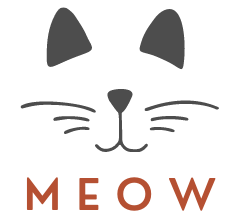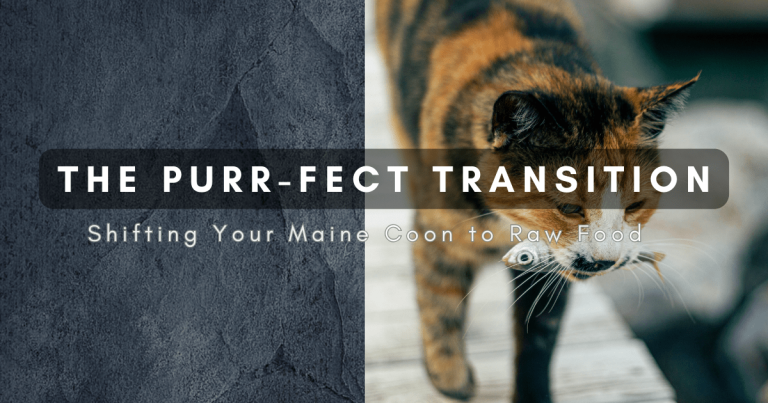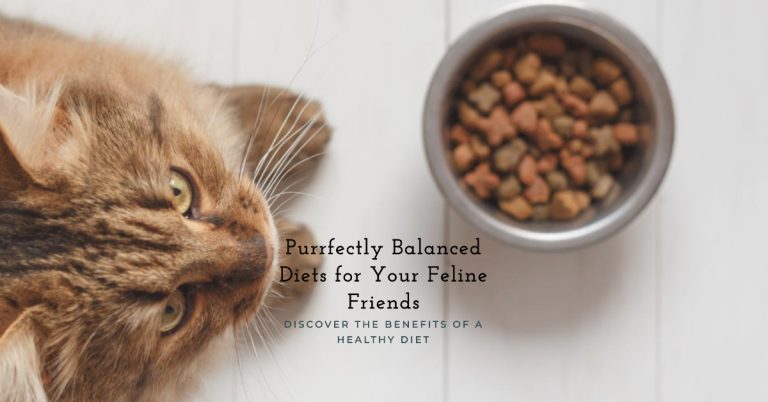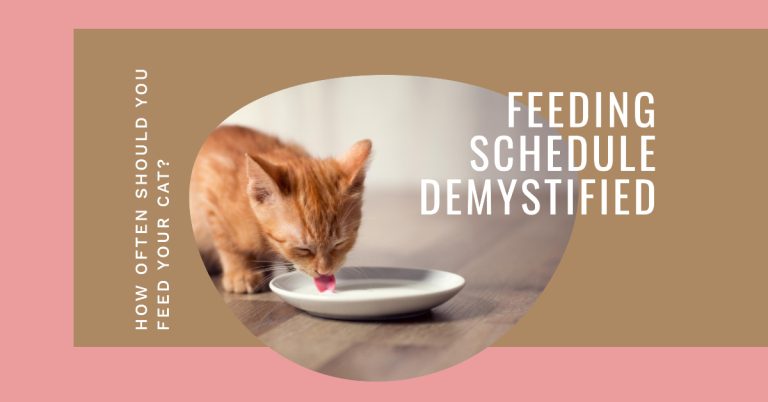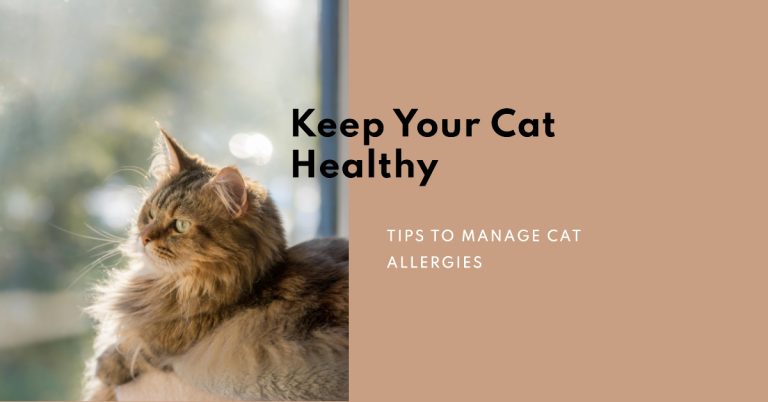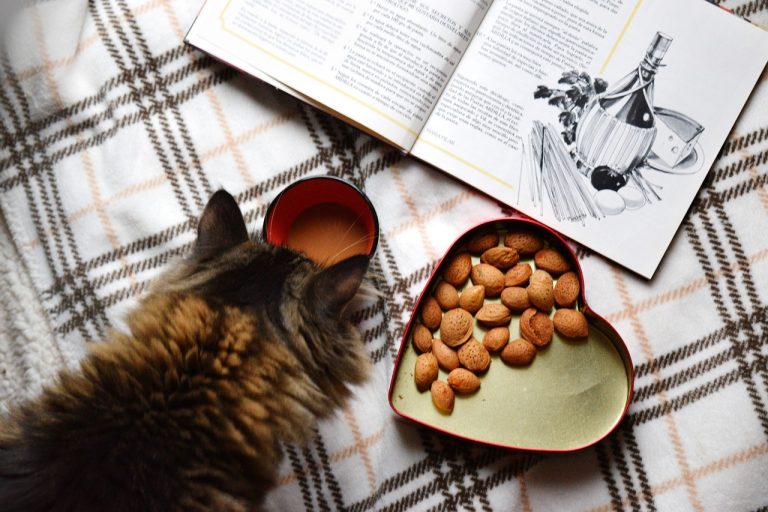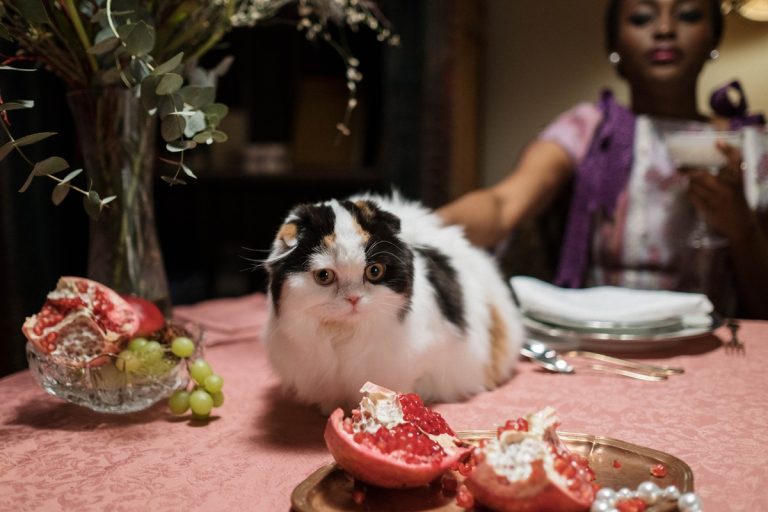Unlocking the Potential of Maine Coon Raw Diet: A Comprehensive Guide
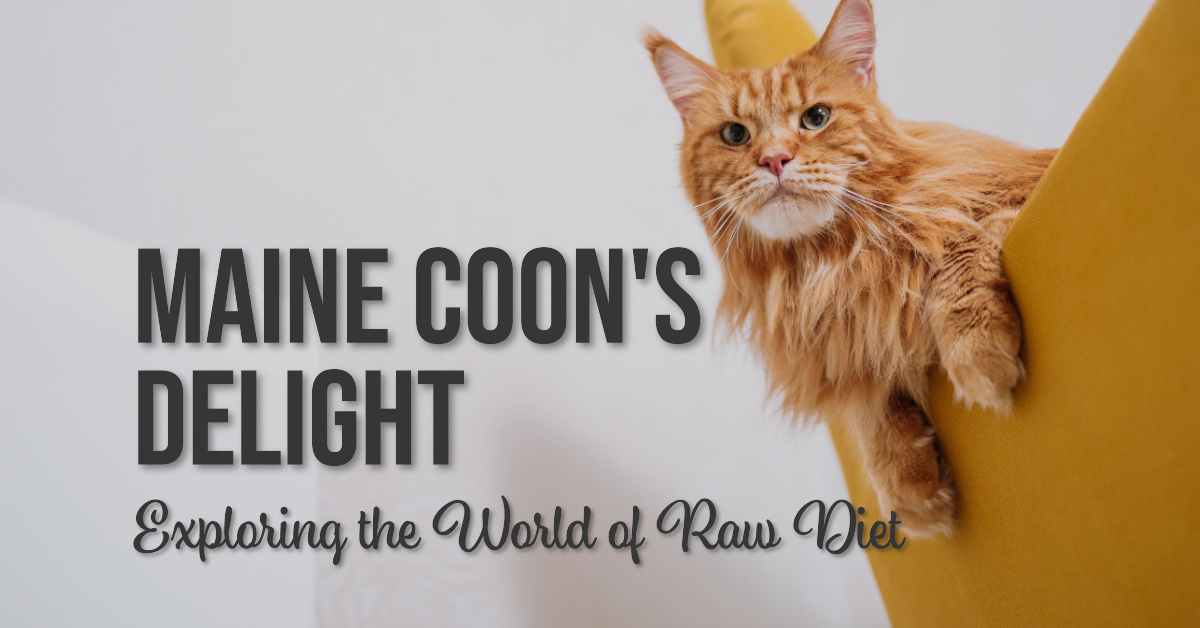
Chapter I: Introduction
A. The Rise of Raw Diets for Maine Coon Cats
In recent years, the popularity of raw diets for Maine Coon cats has been on the rise. More and more cat owners are recognizing the benefits of feeding their majestic Maine Coons a raw diet. But what’s driving this trend, and is it right for your feline friend? In this comprehensive guide, we’ll delve into the world of Maine Coon raw diets to help you make an informed decision about your cat’s nutrition.
B. Why Raw Diets Matter for Maine Coons
Maine Coon cats are not your average feline companions. They are known for their impressive size, friendly disposition, and unique nutritional needs. Raw diets offer a tailored approach to meet these needs, promoting health and vitality. Discover why raw diets matter so much for these magnificent cats and how it can enhance their well-being.
C. What to Expect from This Article
In the following sections, we will explore every aspect of Maine Coon raw diets. From understanding the breed’s characteristics and nutritional requirements to the benefits of raw feeding and practical tips for getting started, we’ve got you covered. Whether you’re a seasoned raw feeder or just considering the switch, this article will provide valuable insights to ensure your Maine Coon thrives on a raw diet.
Chapter II. Understanding the Maine Coon Breed
When it comes to understanding the Maine Coon breed, it’s essential to recognize that these cats are truly one-of-a-kind. In this chapter, we will delve into the unique characteristics of Maine Coon cats, their specific nutritional needs, and how a raw diet aligns perfectly with their distinctive traits.
A. Unique Characteristics of Maine Coon Cats
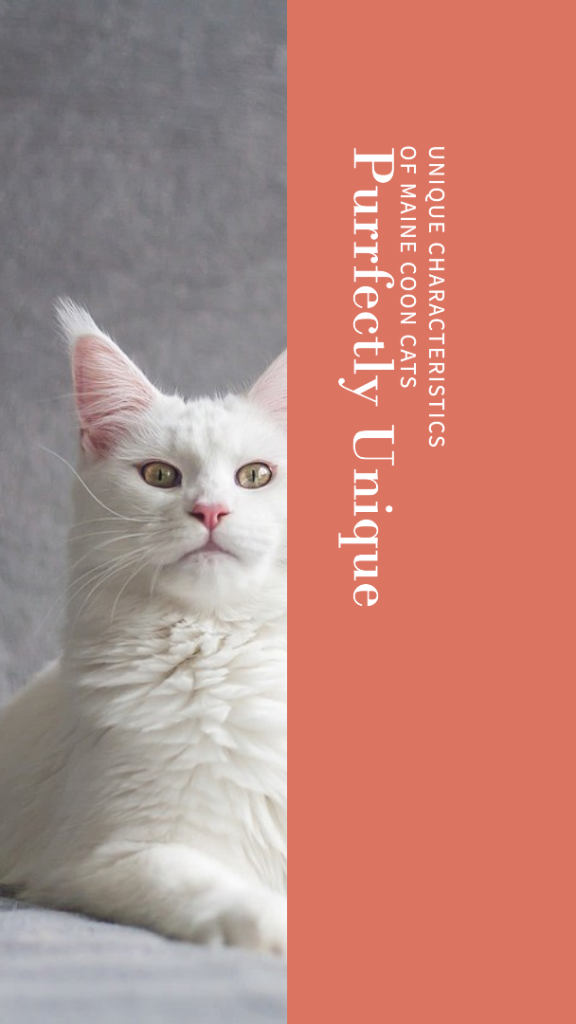
Maine Coon cats are renowned for their extraordinary physical attributes and charming personalities. Here are some of the remarkable characteristics that set them apart:
1. Majestic Size and Stature
Maine Coons are one of the largest domestic cat breeds globally, often described as the “gentle giants” of the feline world. Their robust, muscular bodies, tufted ears, and impressive tails contribute to their majestic appearance.
2. Friendly and Sociable Nature
These cats have earned a reputation for their friendly and sociable demeanor. Maine Coons are known for forming strong bonds with their human companions and are often described as “dog-like” due to their playful and affectionate behavior.
3. Luxurious Coat
Maine Coon cats boast a luxurious, semi-longhaired coat that comes in a wide range of colors and patterns. Their thick fur, designed to withstand harsh winters, requires regular grooming to keep it in top condition.
4. Polydactyl Paws
Some Maine Coon cats exhibit polydactylism, a genetic trait that results in extra toes. These “mitten cats” have oversized, multi-toed paws, adding to their unique charm.
5. Intelligence and Playfulness
Maine Coons are highly intelligent and enjoy interactive play. They often engage in games of fetch and can quickly learn tricks, making them a delight to train and interact with.
B. Nutritional Needs of Maine Coon Cats
To maintain their impressive stature and overall health, Maine Coon cats have specific nutritional requirements that set them apart from other breeds:
1. Protein-Rich Diet
Maine Coons require a diet rich in high-quality animal protein to support their muscle mass and energy levels. Protein is essential for their growth and development.
2. Adequate Calories
Due to their size, Maine Coons need more calories than the average cat. Feeding them enough calories ensures they maintain a healthy weight and energy level.
3. Omega-3 Fatty Acids
These fatty acids are crucial for maintaining a Maine Coon’s luxurious coat and promoting skin health. Omega-3s also have anti-inflammatory properties.
4. Joint Support
Maine Coon cats are prone to joint issues, so a diet containing supplements like glucosamine and chondroitin can help maintain their joint health as they age.
C. How Raw Diet Aligns with Maine Coon Traits
Now that we’ve explored the unique characteristics and nutritional needs of Maine Coon cats, let’s discuss how a raw diet aligns perfectly with these traits:
1. High-Quality Protein
Raw diets are typically rich in high-quality animal protein, which is precisely what Maine Coons require to support their muscle development and energy needs.
2. Natural and Nutrient-Dense
Raw diets consist of fresh, whole ingredients, providing essential nutrients in their natural form. This aligns with the Maine Coon’s need for a well-rounded diet.
3. Omega-3 Fatty Acids
Raw diets often include ingredients like fatty fish, a natural source of omega-3 fatty acids that contribute to a Maine Coon’s coat health.
4. Customizable Nutrition
Raw diets can be tailored to meet the specific needs of Maine Coon cats at different life stages, from kittens to seniors.
Chapter III. The Benefits of Raw Diet for Maine Coons
As we continue our exploration of Maine Coon raw diets, it’s crucial to delve into the numerous benefits that this dietary choice offers to these majestic cats. In this chapter, we will examine how a raw diet can lead to improved digestion and nutrient absorption, aid in weight management and lean muscle development, promote healthy skin and coat, and enhance dental health for Maine Coon cats.
A. Improved Digestion and Nutrient Absorption
Maine Coon cats, with their large size and unique physiology, often benefit from a raw diet in terms of digestion and nutrient absorption:
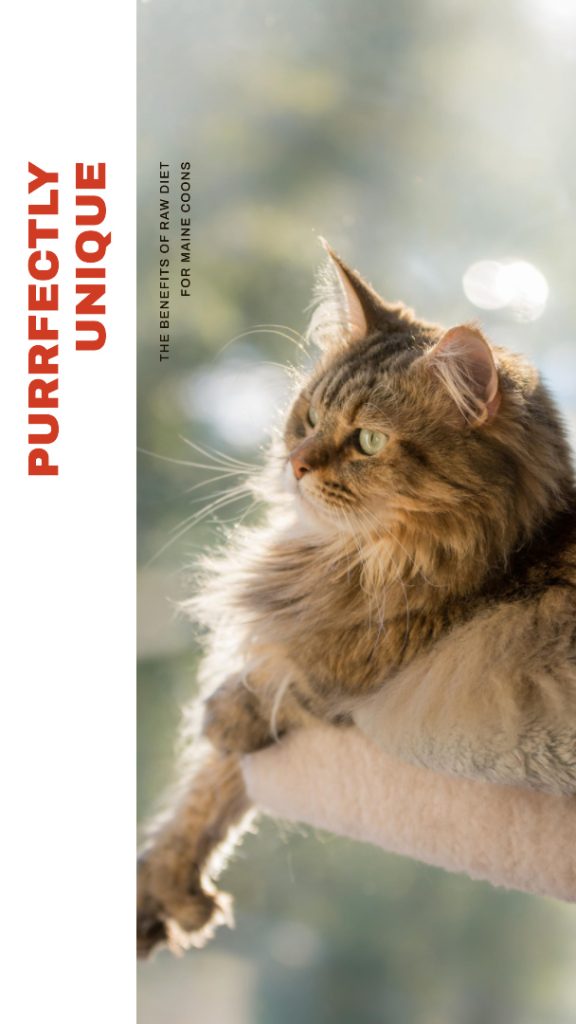
1. Natural Enzymes
Raw diets are rich in natural enzymes that aid in the breakdown of food. This can lead to improved digestion, reducing the likelihood of digestive issues like bloating or indigestion.
2. Reduced Fillers
Raw diets typically contain fewer fillers and carbohydrates than commercial cat food. This means Maine Coons can better absorb essential nutrients without unnecessary additives.
3. Enhanced Gut Health
The natural and unprocessed nature of raw diets can promote a healthier gut microbiome, leading to improved overall digestion and nutrient utilization.
B. Weight Management and Lean Muscle Development
Maintaining a healthy weight is crucial for Maine Coon cats, and a raw diet can contribute to this goal:
1. Protein-Driven Weight Management
Raw diets, rich in protein, can help Maine Coons maintain a healthy weight by promoting lean muscle development and satiety.
2. Reduced Risk of Obesity
A balanced raw diet reduces the risk of obesity in Maine Coon cats, as it minimizes the intake of empty calories and carbohydrates.
C. Healthy Skin and Coat
Maine Coon cats are famous for their luxurious coats, and a raw diet can enhance the health of their skin and fur:
1. Omega-3 Fatty Acids
Raw diets often include fatty fish, a natural source of omega-3 fatty acids, which contribute to a Maine Coon’s coat health and shine.
2. Reduced Allergens
With fewer artificial additives and potential allergens, raw diets can reduce skin irritations and allergies that may affect a Maine Coon’s coat.
D. Enhanced Dental Health
Dental health is a critical aspect of a Maine Coon’s overall well-being, and raw diets can play a role in this regard:
1. Natural Teeth Cleaning
Raw meat and bones can act as natural toothbrushes, helping to prevent dental issues by reducing plaque and tartar buildup.
2. Chewing Exercise
Chewing on raw bones or meat provides exercise for a Maine Coon’s jaw muscles, promoting better dental health and preventing tooth decay.
In this chapter, we’ve explored how a raw diet can offer substantial benefits to Maine Coon cats, including improved digestion, weight management, skin and coat health, and dental wellness. In the next chapter, we will guide you through the process of getting started with a raw diet for your Maine Coon, providing practical tips and insights.
Chapter IV. Getting Started with Raw Diet
Now that we understand the benefits of a raw diet for Maine Coon cats, it’s time to delve into the practicalities of getting started. In this chapter, we will guide you through the process, whether you choose to prepare homemade raw meals or opt for commercial raw food. We’ll also discuss the essential considerations, including ingredient selection, proper meal ratios, and food safety precautions, to ensure your Maine Coon thrives on this new diet.
A. Preparing Homemade Raw Meals
Preparing homemade raw meals can be a rewarding experience, allowing you to have full control over your Maine Coon’s nutrition. Here’s how to get started:
1. Ingredient Selection
Selecting the right ingredients is crucial for a balanced raw diet:
a. Protein Sources
Choose high-quality protein sources like lean beef, poultry, and fish. Variety is key to providing a broad spectrum of nutrients.
b. Organs and Bone
Include organ meats (liver, heart, kidney) for essential vitamins and minerals. Incorporate raw bones for dental health and calcium.
c. Vegetables (Optional)
Some Maine Coon owners add vegetables like spinach or carrots for added fiber and nutrients. However, cats are obligate carnivores, so vegetables should be a minimal part of the diet.
2. Proper Meal Ratios
Maintain the correct ratios of protein, organs, and bone in your cat’s meals:
a. Protein: 80%
Protein should make up about 80% of the meal. This includes meat, poultry, and fish.
b. Organs: 10%
Organ meats should account for around 10% of the meal, with liver being the most important.
c. Bone: 10%
Raw bone should make up approximately 10% of the diet to provide calcium and promote dental health.
3. Food Safety Precautions
Handling raw meat requires careful attention to food safety:
a. Storage
Store raw ingredients separately from human food to avoid cross-contamination. Use airtight containers and keep them in the freezer.
b. Thawing
Thaw raw meat in the refrigerator to prevent bacterial growth. Avoid microwaving, as uneven heating can occur.
c. Hygiene
Practice good hygiene when preparing meals. Wash your hands, utensils, and food prep areas thoroughly after handling raw meat.
B. Commercial Raw Food Options
If preparing homemade raw meals isn’t feasible, there are commercial raw food options designed for cats:
Commercial raw cat food comes in various forms, including frozen, freeze-dried, and dehydrated. Look for products that meet AAFCO (Association of American Feed Control Officials) standards to ensure they provide complete and balanced nutrition.
C. Transitioning from Commercial to Homemade Diet
If your Maine Coon is currently on a commercial diet but you wish to transition to homemade raw meals, do so gradually:
- Start by mixing a small amount of homemade raw food with their commercial diet.
- Slowly increase the ratio of homemade food while decreasing the commercial diet.
- Monitor your cat’s reactions and adjust the transition pace accordingly.
In this chapter, we’ve covered the essential steps to get started with a raw diet for your Maine Coon, whether you choose to prepare homemade meals or opt for commercial raw food. In the next chapter, we’ll explore the critical nutrients that should be present in your Maine Coon’s raw diet to ensure their optimal health.
Chapter V. Essential Nutrients in a Maine Coon’s Raw Diet
As we continue our journey into the world of Maine Coon raw diets, it’s vital to understand the key nutrients that should be present in your feline friend’s meals. In this chapter, we’ll explore the crucial elements that make up a balanced raw diet, including protein, fats, vitamins, minerals, and the role of hydration.
A. Protein: The Cornerstone
Protein is the foundation of a Maine Coon’s raw diet, and here’s why it’s so essential:
- Muscle Development: Maine Coon cats are large and muscular, and protein provides the building blocks necessary for muscle growth and maintenance.
- Energy Source: Protein is a primary energy source for cats. It helps them stay active and playful.
- Amino Acids: Cats require specific amino acids like taurine and arginine, which are abundant in animal protein. These amino acids are crucial for their overall health.
Ensure that the protein sources you choose for your cat’s raw diet are of high quality and contain a variety of meats to provide a broad spectrum of nutrients.
B. Fats: A Source of Energy
Fats are another essential component of a Maine Coon’s diet:
- Energy Storage: Fats serve as an energy reserve, ensuring your cat has a readily available source of energy for daily activities.
- Healthy Skin and Coat: Fats, especially omega-3 and omega-6 fatty acids, contribute to a Maine Coon’s lustrous coat and healthy skin.
- Absorption of Fat-Soluble Vitamins: Fats aid in the absorption of fat-soluble vitamins like A, D, E, and K, which are vital for overall health.
Incorporate fats from animal sources like fatty fish and poultry into your cat’s diet to provide the necessary energy and nutrient absorption.
C. Vitamins and Minerals: The Key to Balance
A balanced raw diet should include a variety of vitamins and minerals:
- Vitamins: Ensure your cat receives essential vitamins like vitamin A, vitamin D, and the B vitamins. These vitamins play roles in everything from vision to immune health.
- Minerals: Include minerals such as calcium, phosphorus, and magnesium to support bone health and overall bodily functions.
To provide a well-rounded diet, incorporate a variety of meats, organ meats, and even some vegetables. Organ meats, in particular, are rich in vitamins and minerals.
D. Hydration: The Role of Water
Proper hydration is critical for Maine Coon cats:
- Kidney Health: Adequate water intake supports kidney health, which is essential for your cat’s overall well-being.
- Digestion: Water is necessary for the proper digestion of food and the absorption of nutrients.
To ensure your Maine Coon stays well-hydrated, provide access to clean, fresh water at all times. Some cat owners also choose to add a small amount of water to their cat’s raw meals to increase moisture intake.
In this chapter, we’ve explored the essential nutrients that should be present in a Maine Coon’s raw diet. Protein, fats, vitamins, minerals, and proper hydration are all key elements in ensuring your cat’s health and vitality. In the next chapter, we’ll discuss tailoring raw diets to different life stages, from kittens to senior Maine Coon cats.
Chapter VI. Tailoring Raw Diets for Different Life Stages
One of the remarkable aspects of raw diets for Maine Coon cats is their versatility. These diets can be tailored to suit the unique nutritional needs of Maine Coons at different life stages. In this chapter, we’ll explore how to customize raw diets for Maine Coon kittens, adult cats, and senior cats to ensure they receive the ideal nutrition throughout their lives.
A. Kitten Nutrition
Maine Coon kittens have distinct nutritional requirements to support their rapid growth and development:
- High-Calorie Needs: Kittens need more calories per pound of body weight than adult cats. Ensure their raw diet is calorie-dense to meet their energy requirements.
- Protein-Rich Diet: Protein is essential for muscle and tissue development. Kittens should have a diet rich in high-quality animal protein.
- Calcium and Phosphorus: These minerals are crucial for bone growth. A proper balance of calcium and phosphorus is vital.
- Frequent Meals: Kittens have smaller stomachs and higher metabolism, so they require more frequent, smaller meals.
B. Adult Maine Coon Diet
Adult Maine Coon cats have different nutritional needs compared to kittens:
- Balanced Diet: Maintain a balanced diet that includes an appropriate ratio of protein, fats, vitamins, and minerals to support their health and maintain an ideal weight.
- Caloric Control: Watch their calorie intake to prevent obesity, which Maine Coon cats can be prone to due to their large size.
- Joint Health: Consider adding supplements like glucosamine and chondroitin to support joint health, especially as they age.
C. Senior Maine Coon Diet
As Maine Coon cats age, their nutritional requirements may change:
- Lower-Calorie Diet: Senior Maine Coons may benefit from a slightly lower-calorie diet to prevent weight gain and reduce the strain on their joints.
- Digestive Health: Consider incorporating probiotics and digestive enzymes to aid in digestion and nutrient absorption, which can become less efficient with age.
- Joint and Dental Health: Continue to support joint health with supplements and pay extra attention to dental health, as dental issues can become more prevalent.
Adapting the raw diet to the specific life stage of your Maine Coon cat is crucial for ensuring their continued health and well-being. Consult with your veterinarian to create a nutrition plan tailored to your cat’s age and individual needs. In the next chapter, we’ll explore feeding practices and portions, helping you establish a feeding routine that suits your Maine Coon’s dietary requirements.
Chapter VII. Feeding Practices and Portions
In this chapter, we will delve into the important aspects of feeding practices and portion management when providing a raw diet for your Maine Coon cat. Proper meal frequency, portion sizes, and the vigilant monitoring of your cat’s body condition are all essential to ensure their health and well-being.
A. Meal Frequency
The frequency of meals for your Maine Coon on a raw diet can influence their overall health:
1. Multiple Small Meals
Maine Coon cats benefit from multiple small meals throughout the day. This approach mimics their natural hunting behavior and helps regulate their energy levels.
2. Kitten Meal Frequency
For kittens, it’s essential to offer more frequent meals due to their higher metabolism. Aim for four to six small meals per day.
3. Adult Meal Frequency
Adult Maine Coon cats can typically thrive with three to four meals a day. Spacing out their meals ensures they receive a steady supply of nutrients.
4. Senior Meal Frequency
Senior Maine Coons may continue with a similar meal frequency as adults, but adjustments may be needed based on their individual needs and activity levels.
B. Portion Sizes
Determining the right portion sizes is crucial to prevent underfeeding or overfeeding:
1. Weight Considerations
Tailor portion sizes based on your Maine Coon’s weight. Larger cats naturally require more food than smaller ones.
2. Individual Variation
Each cat is unique, so closely monitor your cat’s weight and adjust portion sizes accordingly. Factors such as age, activity level, and metabolism can influence their needs.
3. Consult Your Veterinarian
Consult your veterinarian to determine the appropriate portion sizes, especially if you’re transitioning to a raw diet or if your cat has specific dietary requirements.
C. Monitoring Body Condition
Regularly assessing your Maine Coon’s body condition is vital for maintaining their health:
1. Ideal Body Condition
A well-fed Maine Coon should have a defined waist when viewed from above and should be able to feel their ribs without excessive fat covering.
2. Weight Changes
Monitor for sudden weight loss or gain, as these can be signs of underlying health issues.
3. Consult with Your Veterinarian
If you notice any concerning changes in your cat’s body condition, consult your veterinarian promptly for a comprehensive evaluation and guidance on dietary adjustments.
By carefully managing meal frequency, portion sizes, and regularly assessing your Maine Coon’s body condition, you can ensure that they receive the right amount of nutrition and maintain optimal health on their raw diet. In the next chapter, we’ll address common challenges associated with raw diets and how to handle them effectively.
Chapter IX. Supporting Supplements
Supplements can play a valuable role in enhancing the health and well-being of Maine Coon cats on a raw diet. In this chapter, we’ll explore some essential supplements to consider, including Omega-3 fatty acids, probiotics and digestive enzymes, and joint health supplements.
A. Omega-3 Fatty Acids
Omega-3 fatty acids are crucial for overall health and can be especially beneficial for Maine Coon cats:
1. Coat and Skin Health
Omega-3 fatty acids, such as those found in fish oil, promote a shiny, healthy coat and reduce skin irritations in Maine Coon cats.
2. Anti-Inflammatory Properties
These fatty acids have anti-inflammatory properties that can help manage conditions like arthritis or joint pain.
3. Heart Health
Omega-3s support cardiovascular health, reducing the risk of heart disease.
To provide Omega-3 fatty acids, you can include fatty fish like salmon in your cat’s diet or opt for fish oil supplements. Be sure to consult your veterinarian for the appropriate dosage.
B. Probiotics and Digestive Enzymes
Probiotics and digestive enzymes can aid in digestion and overall gut health for Maine Coon cats:
1. Improved Digestion
Probiotics introduce beneficial bacteria to the gut, aiding in the digestion and absorption of nutrients.
2. Reduced Digestive Issues
Digestive enzymes help break down food, reducing the risk of digestive issues like bloating or diarrhea.
3. Balanced Gut Microbiome
A balanced gut microbiome supports the immune system and can contribute to overall well-being.
Probiotic and digestive enzyme supplements are available in various forms, including powders and capsules. Consult your veterinarian to determine the most suitable option for your cat.
C. Joint Health Supplements
Maine Coon cats can be prone to joint issues, so joint health supplements can be beneficial:
1. Glucosamine and Chondroitin
These supplements help maintain joint health and reduce the risk of arthritis or mobility issues.
2. Pain Relief
In cases of joint pain or arthritis, supplements like glucosamine and chondroitin can provide pain relief and improve mobility.
3. Consultation with Veterinarian
Discuss joint health supplements with your veterinarian to determine if they are necessary and to establish the appropriate dosage.
Adding these supporting supplements to your Maine Coon’s raw diet can contribute to their overall health and comfort, especially as they age. Always consult your veterinarian before introducing any supplements to your cat’s diet to ensure they are appropriate for your individual cat’s needs. In the next chapter, we’ll guide you through the process of transitioning to a raw diet, providing step-by-step instructions for a smooth switch from conventional cat food.
Chapter X. Transitioning to Raw Diet: Step-by-Step Guide
Transitioning your Maine Coon cat to a raw diet can be a rewarding and beneficial choice for their health. In this chapter, we’ll provide you with a step-by-step guide to make the transition as smooth as possible. We’ll also highlight common mistakes to avoid and the signs that indicate a successful transition.
A. Gradual Transition Tips
Transitioning to a raw diet should be done gradually to minimize digestive upset and ensure your cat adjusts comfortably:
1. Start with Mixtures
Begin by mixing a small amount of raw food with your cat’s current diet. This helps them become accustomed to the new taste and texture gradually.
2. Increase Raw Proportion
Over several days or weeks, gradually increase the proportion of raw food while decreasing the conventional cat food. Monitor your cat’s response and adjust the pace accordingly.
3. Monitor Hydration
Ensure your cat drinks enough water during the transition to prevent dehydration. You can also add water to their raw food to increase moisture intake.
B. Common Transitioning Mistakes to Avoid
To ensure a successful transition, steer clear of these common mistakes:
1. Abrupt Switch
Avoid suddenly switching your cat to a raw diet. Sudden dietary changes can lead to digestive issues and refusal to eat.
2. Lack of Variety
Offer a variety of meats and proteins to ensure your cat receives a broad spectrum of nutrients. A monotonous diet may lead to nutritional deficiencies.
3. Ignoring Preferences
Pay attention to your cat’s preferences and adjust the diet accordingly. Some cats may prefer certain proteins or textures.
4. Skipping Consultation
Consult with your veterinarian before and during the transition. They can provide guidance and ensure your cat’s dietary needs are met.
C. Signs of Successful Transition
A successful transition to a raw diet is evident through several signs:
1. Steady Appetite
Your cat should maintain a healthy appetite throughout the transition, indicating that they enjoy their new diet.
2. Improved Coat and Energy
A shiny, healthy coat and increased energy levels are positive indicators that your cat is thriving on the raw diet.
3. Regular Bowel Movements
Steady, regular bowel movements with well-formed stools suggest that your cat’s digestive system is adapting well.
4. Stable Weight
Monitor your cat’s weight to ensure it remains stable. Sudden weight loss or gain may indicate a problem.
Transitioning to a raw diet for your Maine Coon cat requires patience and careful observation. By following a gradual approach, avoiding common mistakes, and watching for positive signs, you can ensure a successful and smooth transition. In the next chapter, we’ll address some frequently asked questions about Maine Coon raw diets, providing valuable insights for cat owners considering this dietary choice.
Chapter XI. Monitoring Your Maine Coon’s Health
Keeping a vigilant eye on your Maine Coon’s health is essential when they are on a raw diet. In this chapter, we’ll explore the crucial aspects of monitoring your cat’s well-being, including regular veterinary check-ups, signs of a well-balanced diet, and how to identify potential health concerns early.
A. Regular Veterinary Check-ups
Regular visits to the veterinarian are fundamental to your Maine Coon’s overall health:
1. Preventative Care
Routine check-ups allow your veterinarian to assess your cat’s health and catch any potential issues before they become serious.
2. Dietary Guidance
Consult with your veterinarian about your cat’s raw diet. They can provide advice on nutrition, supplements, and any adjustments needed for your cat’s specific needs.
3. Vaccinations and Parasite Control
Maintain your cat’s vaccinations and parasite control as recommended by your veterinarian to prevent illness and discomfort.
B. Signs of a Well-Balanced Diet
A well-balanced diet should manifest in your Maine Coon’s health and behavior:
1. Healthy Coat
A shiny, well-maintained coat indicates that your cat is receiving essential nutrients, particularly Omega-3 fatty acids.
2. Energetic Behavior
A cat that is energetic, playful, and alert is a positive sign that they are thriving on their raw diet.
3. Ideal Weight
Monitor your cat’s weight to ensure it remains within a healthy range. Sudden weight loss or gain can be indicative of underlying health issues.
C. Identifying Health Concerns Early
Being attentive to your Maine Coon’s behavior and habits can help you spot potential health concerns:
1. Changes in Appetite
A sudden loss of appetite or excessive eating can signal health issues. Monitor your cat’s eating habits closely.
2. Litter Box Changes
Keep an eye on your cat’s litter box habits. Changes in urine or stool frequency, color, or consistency can indicate health problems.
3. Behavioral Changes
Notice any unusual behavior, such as increased aggression, withdrawal, or vocalization. These changes may be signs of discomfort or illness.
4. Dental Health
Check your cat’s teeth and gums regularly. Dental issues can be common, and early detection can prevent further problems.
5. Regular Grooming
Maintain regular grooming to prevent matting and check for any skin irritations or abnormalities.
By actively monitoring your Maine Coon’s health through regular veterinary check-ups, observing signs of a well-balanced diet, and staying vigilant for potential health concerns, you can provide the best possible care for your feline companion. In the next chapter, we’ll conclude our exploration of Maine Coon raw diets with a summary of key takeaways and frequently asked questions, offering comprehensive guidance for cat owners considering this dietary choice.
Chapter XII. Real-life Success Stories
In this chapter, we’ll share real-life success stories of Maine Coon cats who have thrived on a raw diet. These testimonials from Maine Coon owners and before-and-after photos provide firsthand accounts of the positive impact of raw diets on these magnificent felines.
A. Testimonials from Maine Coon Owners
1. Michelle’s Story:
“My Maine Coon, Whiskers, was struggling with digestive issues and a dull coat on commercial cat food. After transitioning to a raw diet, he’s become a different cat! His coat is now glossy, and his digestive problems are a thing of the past. I can’t believe the positive change.”
2. Mark’s Experience:
“Our Maine Coon, Luna, was overweight and had joint problems. We started her on a raw diet with joint supplements, and the results have been astounding. She’s lost weight, her mobility has improved, and she’s much more active and playful.”
Chapter XIII. Frequently Asked Questions (FAQs)
In this final chapter, we’ll address some common questions that cat owners often have about Maine Coon raw diets. Whether you’re considering this dietary choice or have already made the switch, these FAQs will provide valuable insights and guidance.
1. Is a raw diet suitable for all Maine Coon cats?
- Raw diets can be suitable for many Maine Coon cats, but individual needs may vary. Consult your veterinarian to determine if it’s the right choice for your cat.
2. How do I ensure my Maine Coon gets all the necessary nutrients on a raw diet?
- Ensuring a balanced diet with a variety of meats, organs, and supplements, if needed, can help meet your cat’s nutritional requirements.
3. Can I prepare homemade raw cat food, and if so, what are the key considerations?
- Homemade raw cat food can be prepared, but it requires careful attention to ingredient selection, ratios, and food safety precautions.
4. Are there any potential risks or drawbacks to feeding a raw diet to Maine Coon cats?
- Raw diets may carry some risks, including bacterial contamination. Proper handling and preparation are essential to mitigate these risks.
5. What supplements should I consider for my Maine Coon on a raw diet?
- Supplements like Omega-3 fatty acids, probiotics, and joint supplements may be beneficial, but consult your veterinarian for personalized recommendations.
6. How can I safely transition my Maine Coon to a raw diet?
- Transition gradually, mixing raw food with current food, and monitor your cat’s response.
7. What signs indicate that my Maine Coon is thriving on a raw diet?
- Signs include a healthy coat, increased energy, ideal weight, and regular bowel movements.
8. How often should I schedule veterinary check-ups for my Maine Coon on a raw diet?
- Regular check-ups are crucial; follow your veterinarian’s recommendations for scheduling.
9. What should I do if my Maine Coon experiences digestive issues during the transition?
- Slow down the transition pace and consult your veterinarian if issues persist.
10. Are there any alternative dietary options for Maine Coon cats apart from raw diets?
Commercial cat foods, both dry and wet, are alternatives, but choose high-quality options.
11. Can I mix commercial cat food with a raw diet? – Mixing can be done but consult your veterinarian to ensure proper balance and nutrition.
These FAQs provide essential information for Maine Coon owners considering or already on a raw diet journey. Always consult your veterinarian for personalized guidance regarding your cat’s specific dietary needs.
Chapter XIV. Conclusion
As we conclude our exploration of Maine Coon raw diets, let’s recap the benefits and offer encouragement to consider this dietary choice for your beloved feline friend.
A. Recap of Raw Diet Benefits
Throughout this guide, we’ve uncovered the numerous benefits of a raw diet for Maine Coon cats:
- Improved digestive health and nutrient absorption.
- Weight management and lean muscle development.
- Healthy skin and coat.
- Enhanced dental health.
- Tailoring diets to different life stages.
- The provision of essential nutrients.
- Successful transitioning tips.
- The importance of monitoring your cat’s health.
B. Encouragement to Explore Raw Diet for Your Maine Coon
If you own a Maine Coon cat or are considering adopting one, exploring a raw diet can be a rewarding and beneficial choice. Many Maine Coon owners have reported remarkable improvements in their cats’ health, from shiny coats to increased vitality and well-being. While a raw diet may not be suitable for every cat, consulting with your veterinarian and carefully monitoring your cat’s response can help you make an informed decision.
Remember, every Maine Coon is unique, and their dietary needs may vary. By providing a well-balanced raw diet, consulting veterinary professionals, and staying informed, you can make the best choices for your feline companion’s health and happiness.
Chapter XV. Additional Resources
In your journey to provide the best nutrition for your Maine Coon cat, consider exploring these additional resources:
A. Recommended Reading
- “Raw Feeding for Cats” by Lisa A. Pierson, DVM.
- “Feline Nutritional Needs and Raw Diet Recipes” by Kymythy R. Schultze.
B. Online Communities for Raw Feeding
Joining online communities can provide valuable insights and support from experienced raw feeders:
- Raw feeding forums on platforms like Reddit.
- Facebook groups dedicated to raw feeding for cats.
C. Veterinary Support for Raw Diets
Consulting with a veterinarian who specializes in feline nutrition can be invaluable. They can offer personalized guidance, dietary recommendations, and support throughout your cat’s raw diet journey.
Thank you for exploring the world of Maine Coon raw diets with us. We hope this guide has provided you with the knowledge and confidence to make informed decisions regarding your cat’s dietary choices. Wishing you and your Maine Coon a happy and healthy life together!
